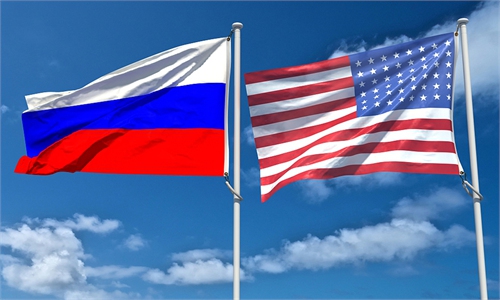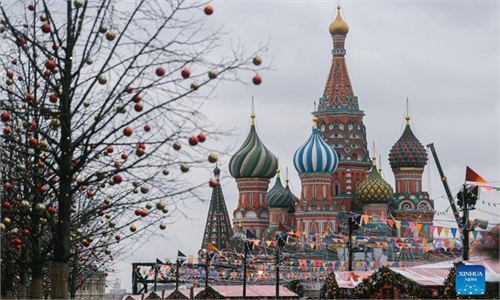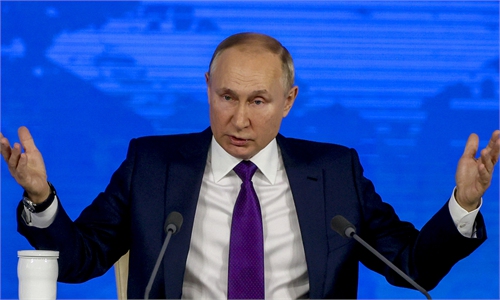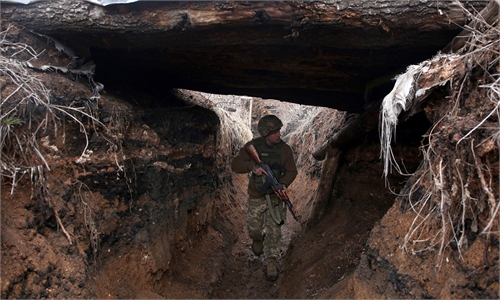US media smearing China-Russia ties on Ukraine issue: foreign ministry
EU not on same page as US, unlikely to be ‘mediator’

A Ukrainian Military Forces serviceman peers through a spyglass in a dugout on the frontline near Gorlivka, Donetsk region on January 23, 2022. Photo: VCG
Disinformation about the Ukraine crisis widely circulating among some Western media including Bloomberg could affect China-Russia mutual trust, and this reflects the "ill intention" of the Western forces trying to instigate divergences between Beijing and Moscow, analysts said.
On Monday, the Chinese Foreign Ministry refuted a Bloomberg report which claimed that the Chinese leader had allegedly "asked Russian President Vladimir Putin not to invade Ukraine during the Beijing 2022 Winter Olympic Games."
"The report was purely made out of thin air. It seeks not only to smear and drive a wedge in China-Russia relations, but also to deliberately disrupt and undermine the Beijing Winter Olympics. Such a despicable trick cannot fool the international community," Zhao Lijian, spokesperson of the Ministry of Foreign Affairs, said at a routine press conference.
The Chinese Embassy in Russia also refuted the report, saying in a statement sent to Russian news agency TASS on Saturday that the news "is a hoax and provocation." The embassy noted that China's position on the Ukrainian issue is consistent and clear.
In addition to the Bloomberg disinformation aimed at disrupting China-Russia relations, Russia's foreign ministry Sunday rejected what it described as "disinformation" from Britain, as the AFP reported, after London accused Moscow of working to install a pro-Russian leader in Ukraine as tensions soar.
Disinformation circulated by the British government is yet another indication that it is the NATO members led by the Anglo-Saxon nations that are escalating tensions around Ukraine, the Russian foreign ministry said in a tweet.
'Forced to react'
The military standoff on the Ukrainian border has reached a very dangerous point, Yang Jin, an associate research fellow at the Institute of Russian, Eastern European and Central Asian Studies at the Chinese Academy of Social Sciences, told the Global Times on Monday.
"No one wants to escalate the crisis into a war, but conflicts could be sparked easily by accidents, and it's hard to fully prevent accidents in the intense stand-off," Yang noted.
"China has always hoped that Russia and the US could solve the problem over Ukraine through dialogue, and this position will not change," Yang said.
Even if some conflicts occur in the coming days, Russia is unlikely to be the one to initiate provocations, since Moscow has previously supported the UN-adopted Olympic Truce during the Beijing 2022 Winter Olympic Games, while some countries like the US, the UK and Australia refused to sign it, said experts. They stressed that the US and its followers are more likely to launch conflicts and Russia is more likely to be the one who is forced to react if the conflicts escalate, similar to what happened in Georgia during the Beijing Olympics 2008.
While some Western media outlets are trying to disrupt China-Russia ties, unity within the West, or between the US and EU members, is in trouble as the EU stance and actions are quite different from those of the US in recent days on the crisis. Experts said the deep-seated divisions inside Europe are making it difficult for the EU to act as a mediator on the current tensions.
EU foreign ministers met in Brussels on Monday calling for a "de-escalation" of the situation around Ukraine, and US Secretary of State Antony Blinken was scheduled to join the meeting via a video link after the US government had ordered families of US diplomats to leave Ukraine. The order came after some US media reported that Russia had deployed 100,000 troops and heavy weapons along the Ukrainian border, sounding alarm bells over its perceived aims in Ukraine, but Moscow insisted that it has no such plans, according to media reports.
EU foreign policy chief Josep Borrell said on Monday that the EU will not follow the US move to withdraw embassy personnel and families in Ukraine, but "all members of the EU are united," and are showing unprecedented unity over the situation in Ukraine, the AP reported.
Amid growing tensions, Ukraine's Defense Minister Oleksii Reznikov said his country had received a second consignment of weapons from the US as part of defense aid totaling $200 million, Reuters reported on Sunday, noting that the US government will continue supporting Ukraine amid concerns over the Russian buildup of military defenses on the border.
Also, Blinken appeared on CNN on Sunday rebuffing calls to immediately impose economic sanctions on Russia, saying that "when it comes to sanctions, the purpose of those sanctions is to deter Russian aggression. And so if they're triggered now, you lose the deterrent effect."
Tensions between the US and Russia over Ukraine showed that both sides are imposing extreme pressure to test each other's bottom lines. The essence of the current Ukraine issue concerns "security guarantees" which both sides want to negotiate but have always failed to reach agreement on, Cui Heng, an assistant research fellow from the Center for Russian Studies of East China Normal University, told the Global Times on Monday.
Europe 'not an iron plate'
The lack of unity within the EU is also obvious on the Ukraine crisis, and the recent resignation of German navy chief Kay-Achim Schonbach for his "pro-Russia" comments exposed the deep-seated divergences within the West over regional security issues, Chinese analysts noted.
Schonbach stepped down after he told a think tank panel during his visit to India on Friday that Putin "probably" deserved respect, and Crimea was "gone" and would "never come back" to Ukraine, arguing in favor of cooperating with Russia to contain China's rise.
Some media reports described the comments as an unprecedented diplomatic incident, and the German government distanced itself from Schonbach's comments, according to German media outlet Deutsche Welle.
On the issues of Ukraine, the traditional EU powers differ with the new members of the block which are usually not as big as the former. "The latter do not want to make trade with Russia at the cost of any country as they worry their own country would also be sacrificed by the US and EU powers in the future, and this is why they keep pushing the US to take tougher tones," Cui noted.
Position within Europe on Russia is clearly at odds with that of the US, some experts said. "Europe is not an iron plate, some countries may have less prejudice against Russia, and the German commander may have no hostility toward the Russian regime," Yang said.
As Russia and Germany enjoy special relationship in their history and their current cooperation extends to sectors such as energy, the attitude of the German navy chief also reflects the country's practical view on foreign relations, which would be beneficial to the development of the national economy and to the stability and security of Europe, experts said.
"Many of the European countries want peace with Russia, unlike the US," Yang said. "Only the US wants chaos." Yang also believed that the Europe can't be the meditator on the issue as it has no longer dominance in its own security affairs, since the US has much say in security affairs of Europe through NATO.






